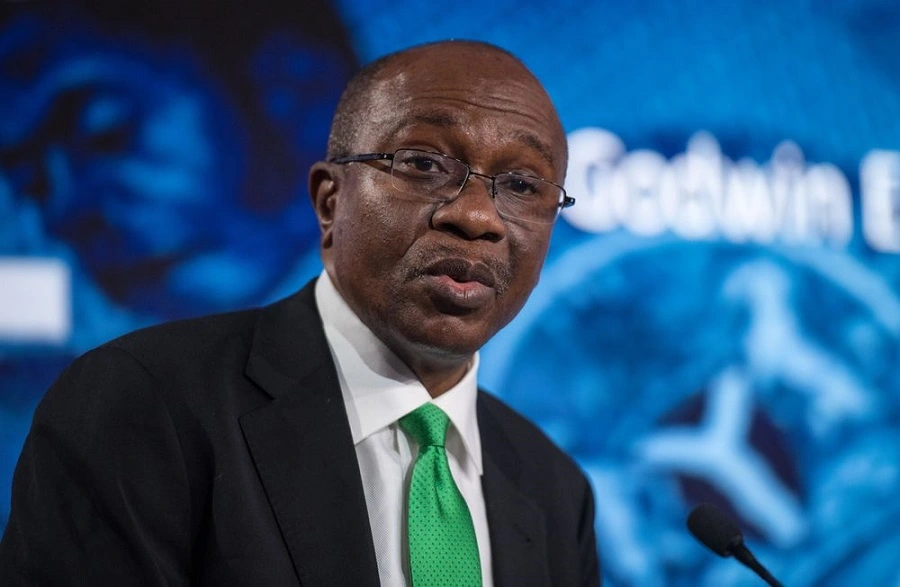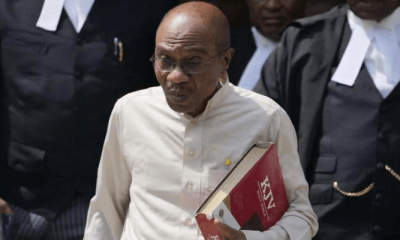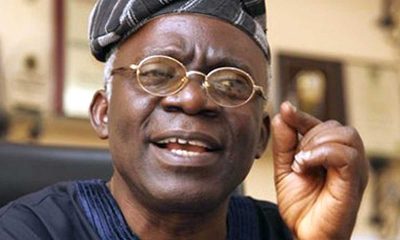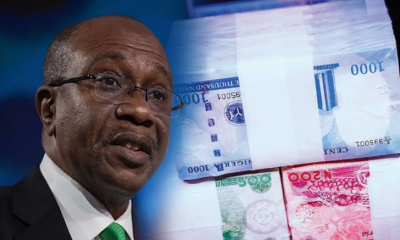Business
Emefiele’s latest invitation to Foreign Investors
Published
2 years agoon
By
Publisher
By Marcel Okeke
The recent call of the Governor of the Central Bank of Nigeria (CBN), Godwin Emefiele, in Washington DC during the 2022 International Monetary Fund/ World Bank Annual Meeting, on foreign investors to “consider Nigeria and other countries in Africa” could be described as auspicious and courageous.
Specifically, the CBN boss urged foreign investors to consider Nigeria and other African countries as “choice destination for investment”, pointing out that African countries were integral to global economic growth. Emefiele told the investors that confidence on the African continent was on the rise.
He said: “Today, we talk about the frontier markets and what I keep telling people is that as you continue thinking about growth opportunities in the world and you are looking at Africa, naturally you will have to think about some of the big economies in Africa.” He listed Nigeria, Angola, South Africa and Egypt as some of the African countries that investors should consider.
Also read: Anchor Borrowers debtors: Time for CBN to bark and bite
Emefiele further told his audience that “Nigeria, Angola, South Africa and Egypt are economies that you would need to think about; and I dare say: these economies hold a lot of strong opportunities with opportunities for high yields and profitable projects, and I can only seize this opportunity to encourage our friends in the foreign investment community to continue to look at Africa.”
In tune with ‘Africa’s years for growth and development’, he said “we cannot do this alone; we will continue to need the support of the rest of the world. But I can assure all of us that as you do this, the opportunities are there and you will not regret taking the opportunities.”
He stressed further that: “…I can only continue to say: let’s give support to Africa; let’s give support to Nigeria. We should all continue to work together for the growth, not just for our individual countries but for Africa as a whole.”
The CBN Governor’s call on foreign investors at this time is most auspicious, given the realignment of bilateral and multilateral relationships engendered by the persisting economic challenges which are rooted in the ravages of the Covid-19 pandemic for a couple of years now. And these have further been exacerbated by the unfolding ripple effects of the Russia-Ukraine war—a lingering confrontation that has affected global (food) supply chain and international trade relations generally.
Also read: RT 200: CBN’s masterstroke strategy in boosting Nigeria’s reserves
Africa and indeed, the ‘frontier markets’ definitely offer fresh and profitable opportunities to discerning investors, as eloquently canvassed by Emefiele. The clarion call for investment in Africa is also timely, as it has the potency to act as counterpoise to the ‘nationalistic’ and ‘anti-globalization’ tendencies unleashed by the import and aftermath of Covid-19; a situation where many countries had to restrict export of their ‘essential goods’ to other nations. Covid-19 vaccines and other critical drugs amply typify such products: in the thick of the pandemic, not a few countries produced and restricted the use of vaccines and other ‘essential goods’ to themselves, not minding the existential threat faced by other nations. This tendency yet subsists to a very large extent.
The CBN Governor’s call, without any iota of doubt, encapsulates and portrays patriotic zeal—copiously expressed and demonstrated in the face of intimidating odds. This, Emefiele alluded to when he said: “when we talk about the challenges that we are currently facing, I can tell you that it has not been easy in the last seven and half years, where we have gone through two recessions.” But truly, Emefiele and the institution he leads (the CBN) have demonstrated resilience, creativity and tenacity in churning out initiatives, strategies and programmes that stimulate and drive growth and development of the Nigerian economy in these tough times.
No wonder, the CBN boss was singled out at the IMF/World Bank meeting and conferred with ‘Africa Most Innovative Digital Transformation Governor of the Year’ Award by Foreign Investment Network (FIN).
Today, in Nigeria, there is hardly any sector or industry that the apex bank is not supporting with its ‘intervention packages’. In playing its developmental role the CBN has structured credit support facilities to suit the needs of operators in virtually all the sectors of the economy, including the micro, small and medium enterprises (MSMEs). Whether it is agriculture, aviation, pharmaceutical or the non-oil exports, financial services, entertainment/creative and manufacturing sectors, the apex bank has put in place a funding facility—usually at concessionary rates of interest (mostly single digit).
The apex bank’s footprints in a number of these sectors are really massive; it has successfully channelled trillions of Naira into productive and profitable enterprises—breathing life into most hitherto moribund businesses. Under the anchor borrowers programme (ABP), one of such flagship initiatives of the apex bank to drive agricultural renaissance in Nigeria, millions of farmers across the country are beneficiaries—and have improved productivity and yields to show for it. Although the ABP is also reported not to have recorded full loan recovery, the apex bank has also put in place creative and watertight mechanisms to ultimately achieve substantial recovery.
The non-oil export initiative of the CBN tagged ‘RT200 FX’ is another very bold and well-thought out programme to stimulate the production and export of a variety of items. The scheme, code-named “Race to $200 billion in FX Repatriation (RT200FX) Programme” consists of a set of policies, plans and programmes for non-oil exports which would help the country attain its goal of $200 billion in FX repatriation, exclusively from non-oil exports transactions over the next three to five years.
Already many corporate organizations are beneficiaries, including Pinnacle Oil and Gas FZE, The Candel Company, Sana Building Systems (SBS)—all in Lagos Free Zone. Indeed, in the words of the President, SBS, Mr. Ken Krieger: “this factory is the result of the funding that we have received and without that support, honestly, we could not have made it happen.
So, we are very grateful that the CBN is diligent in building the economy. We are now exporting into Cameroun, we have projects quoted for Ghana and the Ivory Coast also.”
It goes without saying that the dutiful and creative regulation and supervision of the deposit money banks (DMBs) by the CBN has ensured the effective transmission mechanism and financial intermediation roles of the banks. Thus, through its monetary policy instruments, Nigerian banks’ lending to the private sector has been huge and kept rising in recent years. Affirming this in its communique of September 2022, the Monetary Policy Committee (MPC) of the CBN said: “this consistent positive performance (GDP growth) was driven largely by the sustained growth in the non-oil sector, particularly services and agricultural sub-sectors, supported by continued policy interventions, as well as credit expansion to the private sector.”
In truth, available data show that DMBs’ credit to the private sector rose by 20.19 percent (N6.75 trillion) to N40.19 trillion as of August 2022 compared with N33.44 trillion in the corresponding period of last year. Similarly, banks’ non-performing loans (NPLs) have been falling both in absolute figures and as a ratio to banks’ deposits.
Obviously, it is ‘not yet Uhuru’ for the Nigerian economy; but the headwinds are largely rooted in the fiscal segment of the country’s public finance management. Huge and rising public debt; consistent deficit budgeting and financing; fuel subsidy funding and such other policies are strictly beyond the purview of the apex bank. And these, among others, make Emefiele’s call in Washington on foreign investors to look in ‘Nigeria’s direction’ a heroic and courageous effort.
- Mr. Okeke, a Columnist with National Daily Newspaper, is an economist, sustainability expert and business strategy consultant. Email: [email protected]
You may like


CBN Investigator highlights Emefiele’s gross financial offences


Court grants Emefiele bail


Emefiele’s Naira redesign policy responsible for currency’s scarcity–Falana


No plea bargain with Emefiele — AGF


Rumoured arrest of CBN’s Deputy Governor, Aishah Ahmad not true –family


Drama in Court as DSS, warders’ clash over Emefiele’s custody
Trending

 Health & Fitness2 days ago
Health & Fitness2 days agoMalaria Vaccines in Africa: Pastor Chris Oyakhilome and the BBC Attack

 Comments and Issues1 week ago
Comments and Issues1 week agoNigeria’s Dropping Oil Production and the Return of Subsidy

 Featured6 days ago
Featured6 days agoPolice reportedly detain Yahaya Bello’s ADC, other security details

 Education1 week ago
Education1 week agoEducation Commissioner monitors ongoing 2024 JAMB UTME in Oyo

 Business1 week ago
Business1 week agoMaida, university dons hail Ibietan’s book on cyber politics

 Aviation4 days ago
Aviation4 days agoWhy some airlines are avoiding Nigeria’s airspace–NAMA

 Business6 days ago
Business6 days agoDebt servicing gulps 56% of Nigeria’s tax revenue, says IMF

 Crime1 week ago
Crime1 week agoPolice take over APC secretariat in Benue

